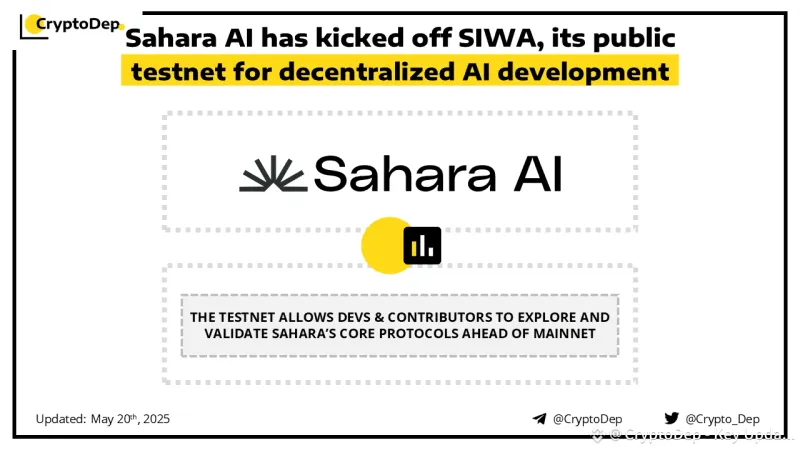SaharaLabsAI: Reshaping the Future of Decentralized AI?

The future of artificial intelligence (AI) and its equitable development is a critical concern, particularly given the increasing concentration of power and resources within a few dominant tech companies. SaharaLabsAI, a promising US-based startup, offers a bold solution: a decentralized blockchain platform for AI, aiming to democratize access and reward contributions fairly. This innovative model tackles the inherent inequalities within the current AI landscape, where data ownership and algorithmic bias often favor large corporations.
Founded by USC Professor Sean Ren and Tyler Zhou, former investment director at Binance Labs, SaharaLabsAI has garnered significant attention and investment, securing a substantial $6 million seed funding round from prestigious investors including Pantera Capital, Polychain Capital, Binance Labs, Sequoia Capital, and Samsung. This substantial backing underscores the potential of their project, Sahara AI, and its vision for a more collaborative and equitable AI ecosystem.
Sahara AI aims to create a collaborative AI economy where contributors – from seasoned AI experts to everyday users – are fairly compensated for their data, expertise, and contributions to improving AI models. This contrasts sharply with the current model, where the benefits of AI development are often concentrated among a select few. The platform uses a tokenized system, potentially incentivizing participation and fostering a more diverse and inclusive community of AI developers and users.
Their solution leverages blockchain technology to ensure transparency, security, and traceability of data and contributions, addressing key concerns around data privacy and accountability. The use of blockchain creates an immutable record of all transactions and contributions, reducing the potential for exploitation and ensuring fair compensation for all participants. This inherent transparency also fosters trust among the community.
The recently launched SIWA project, a public testnet, is a crucial step in the development of the Sahara blockchain. This three-phase rollout allows developers to rigorously test the protocols before the official Mainnet launch. The first phase, focusing on on-chain data ownership, is a significant milestone, demonstrating the platform's commitment to establishing a clear and secure framework for data rights.
The implications of this approach extend beyond simple financial compensation. By establishing clear ownership rights and transparent contribution tracking, SaharaLabsAI aims to mitigate the risks of algorithmic bias. A more diverse and inclusive pool of contributors, incentivized by fair compensation, can lead to the development of AI systems that are less prone to reflecting the biases of a limited group of developers.
SaharaLabsAI's impressive client list, including renowned companies like Microsoft, Amazon, MIT, and Snap, speaks volumes about the platform's potential and market acceptance. The development of products like the Sahara Knowledge Agent (KA), a customizable AI agent that directly compensates experts and companies involved in its training, further exemplifies the company's commitment to a fairer, more equitable AI ecosystem.
The success of SaharaLabsAI's model hinges on widespread adoption and participation. However, the challenges are considerable. Scaling a decentralized platform while maintaining security and efficiency requires significant technical expertise and resources. Furthermore, widespread understanding and acceptance of the platform's tokenized system are crucial for its long-term viability. Overcoming these hurdles will be essential for realizing the vision of a truly democratized and equitable AI future.
Ultimately, SaharaLabsAI's ambitious project represents a significant departure from the current centralized model of AI development. Its success could have profound implications for the future of AI, shaping a more inclusive and equitable landscape where the benefits of AI are shared more broadly across society. The ongoing development and evolution of the Sahara platform will be crucial to observe, providing valuable insights into the potential and limitations of blockchain-based approaches to solving the complex societal challenges posed by AI.
Related articles

GiveRep: Decentralized Reputation Platform Gains Traction with Airdrop and Key Feature Update
Read more
Polymer Labs: A Dual Digital Life in Blockchain and Video Games
Read more